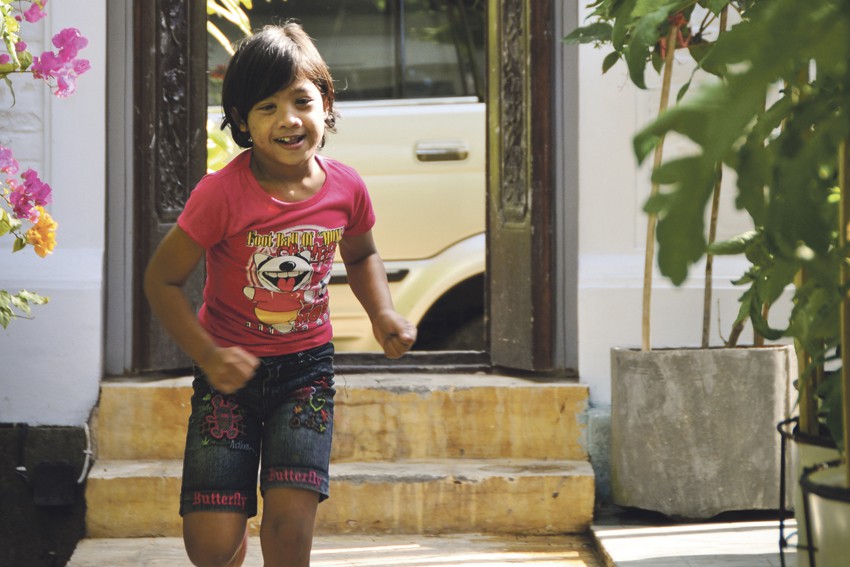Bali eye

Just about everyone has heard of the Fred Hollows Foundation and the work it has done in saving and restoring sight in Asia, Africa and Australia. Less well known is another foundation, which has a strong Adelaide connection and has transformed the lives of tens of thousands of Indonesians through cataract and craniofacial surgery over the past 21 years.
In Bali alone, where the John Fawcett Foundation is based, it has performed more than 34,000 cataract operations and repaired countless cleft palates or facial defects, all of which have either prevented children from getting an education or grandparents seeing their grandchildren. Young men and women who, because of the disability or facial deformity, could not find work or even marry, have been given normal productive lives.
The Bali Eye project has been run by the Australian-based John Fawcett Foundation since 1991, when it began its Sight Restoration and Blindness Prevention Project with a mobile eye clinic that provides cataract surgery free of charge for economically disadvantaged people in the villages of Bali.
There are an estimated four million blind people in Indonesia, more than three million of whom are cataract blind – a condition that is curable in most cases. However, for most Indonesians the cost of a cataract operation is far beyond their financial capacity and they remain blind throughout their lives, a burden on their families and communities.
Each year on average the John Fawcett Foundation screens the sight of 100,000 people in Bali; provides 60-80,000 pairs of glasses; and carries out 3-4000 cataract operations.
This is totally funded with Australian private donations – with no funding from either Australian or Indonesian governments. Each year in Australia the foundation raises between $600,000-$1 million in cash, with a similar amount provided in kind (lenses, glasses frames), providing a total annual budget of $1.5m-$2m.
The foundation is chaired by South Australian tourism entrepreneur Robert Foord and, until his untimely death last year, Adelaide politics lecturer Geoff Anderson was a passionate Board member.
Adelaide Professor of Ophthalmology John Crompton, who is expected to join the foundation’s board later this year, is among the many Australian health professionals – John Fawcett says he has 34 volunteer Australian ophthalmologists on his books – who have freely given their time to train local surgeons to carry out the cataract surgery.
“Any Indonesian doctor who wants to train as an eye surgeon has to find $20-25,000 to grease the palm of their professor,” says Crompton, who has volunteered with Bali Eye for five years. “That means they can only recoup this money by working in private clinics. But the people Bali Eye is helping can’t even afford the bus fare to a hospital, let alone pay a private clinic.
“John Fawcett is a model citizen of the world who has filled a vacuum where nothing was being done before.”
Now aged 81, Fawcett himself is a remarkable story. A former ceramicist, educationalist and deputy director of the Perth Technical College, he has lived in Bali since 1983 after relocating there to recover from a life-threatening medical accident in 1981, which kept him hospitalised for nearly three years. In Bali he recognised the great medical need on the island and, with initial assistance from Rotary Australia, began his humanitarian work which then took over his life.
He was made an AM in 2004, won the John Curtin University Medal in 2003 for his ‘humanitarian work with the sick and poor in Bali, Indonesia’, and a national Indonesian award in 2008.
Bali Eye’s bus-style mobile clinics are run with almost military precision. The foundation now has seven converted buses, each costing around $130,000, which the Indonesian Air Force airlifts to islands such as Lombok and Sulawesi. Each time they turn up in a village there are up to 600 people waiting to see them, 60 percent of whom will need glasses, one in 20 will need cataract surgery.
“It shows what you can do without spending millions on a hospital,” Fawcett says. “It’s taking the service to the people. The blind won’t move. They haven’t moved all their lives.”
Fawcett plays no actual role in the clinical work but he provides the drive and finds the money to make it happen.
“Why should 30,000 Balinese continue to live in darkness,” he asks.
He points to a photograph of six-year-old Yanti, blind since she was a few months old. Two weeks after her operation she’s skidding around Fawcett’s Sanur compound like a dog off a leash. “What’s so special about that?” he asks. “Well, blind people can’t run.”
And then there was Gede Arya Sucipta, also aged six years, looking at his reflection in a shiny car door: “Who’s that?” he asked. He was seeing himself for the first time.
“Our aim is to spend every penny we have on treatment, not administration or other expenses,” said foundation chair Foord.
“We are capable of seeing 1000 people at each clinic,” Fawcett says, “but if our funding runs low we have to cut back.”
Visitors to Bali might well consider this. Each cataract operation costs $60 – pretty much the same as a round of champagne cocktails or a modest meal for two at one of Bali’s ritzy restaurants. That’s what it costs to transform a life.